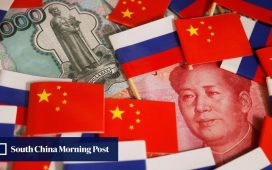“[The United States] confused right and wrong, as well as seriously interfered in Hong Kong affairs and China’s internal affairs,” he said at a press briefing in Beijing.
Blinken made the comments in a press statement about an annual report submitted to the US Congress as part of the country’s Hong Kong Policy Act, which was enacted in 1992. The act gives Washington discretion to treat the city separately from mainland China in areas such as trade and economic engagement.

Wang added that the US had “also seriously violated the principles of international law and the basic norms of international relations”.
“If the US imposes visa restrictions on Hong Kong officials, China will resolutely counter-attack,” he warned.
Wang said the report smeared the city’s national security laws and electoral system, as well as its “democracy, rule of law, human rights and freedoms”.
He urged the US to understand the “one country, two systems” governing principle, adding that Washington should respect China’s sovereignty and Hong Kong’s rule of law.
Blinken said on Friday that the new domestic national security law had “broad and vaguely defined provisions regarding ‘sedition’, ‘state secrets’, and interactions with foreign entities”, which he claimed could be used to eliminate dissent inside and outside the city as part of what he called China’s “ongoing campaign of transnational repression”.
In a report published that day, the US State Department said Beijing had taken “new actions that directly threaten US interests in Hong Kong” and Americans living in the city faced “heightened risk of arrest, detention, expulsion or prosecution” if they publicly criticised China.
Washington-funded Radio Free Asia quits Hong Kong, citing staff safety concerns
Washington-funded Radio Free Asia quits Hong Kong, citing staff safety concerns
The Safeguarding National Security Ordinance took effect on March 23, fulfilling Hong Kong’s obligations under Article 23 of the city’s mini-constitution, the Basic Law.
Hong Kong authorities earlier also condemned the US for “untruthful remarks, slanders and smears”, as well as its “political attacks”.
On Monday, pro-Beijing representatives staged a protest outside the US consulate in Hong Kong to oppose the potential visa restrictions.
Lau Siu-kai, a consultant for Beijing’s semi-official think tank, the Chinese Association of Hong Kong and Macau Studies, said visa restrictions were a mild US retaliatory measure compared with previous political manoeuvres.
“I think the US government did it because it needed to respond to its politicians’ repeated requests. But it does not want to damage the current China-US relationship,” he added.
But Lau said he could not rule out the possibility that Washington would opt for more sanctions against local authorities.
“By then, there is no doubt that [China] will accordingly counter back. There is little Hong Kong can do.”

Beijing previously pushed against the US in 2020 after the latter imposed economic sanctions on 11 Chinese and Hong Kong officials, including then city leader Carrie Lam Cheng Yuet-ngor, over the national security law imposed that year.
China’s retaliatory measures included sanctions against 11 US politicians and NGO leaders considered to have “behaved badly on Hong Kong-related issues”.
Those targeted included US senators Marco Rubio and Ted Cruz, as well as Kenneth Roth, an executive director of Human Rights Watch at the time.
Beijing in 2021 also sanctioned 10 European individuals and four entities, including diplomats, officials, academics and politicians after the European Union joined a multilateral sanctioning blitz over allegations of human rights abuses in Xinjiang, accusations that China has denied.
The Chinese Ministry of Foreign Affairs that year also issued what it called a “criminal record” of US attempts to interfere with Hong Kong affairs and support anti-China troublemakers.
The list, which contained more than 100 “violations of basic norms governing international relations”, was intended to fight against Washington’s criticisms of the political climate in Hong Kong and sanctions against Chinese officials.














